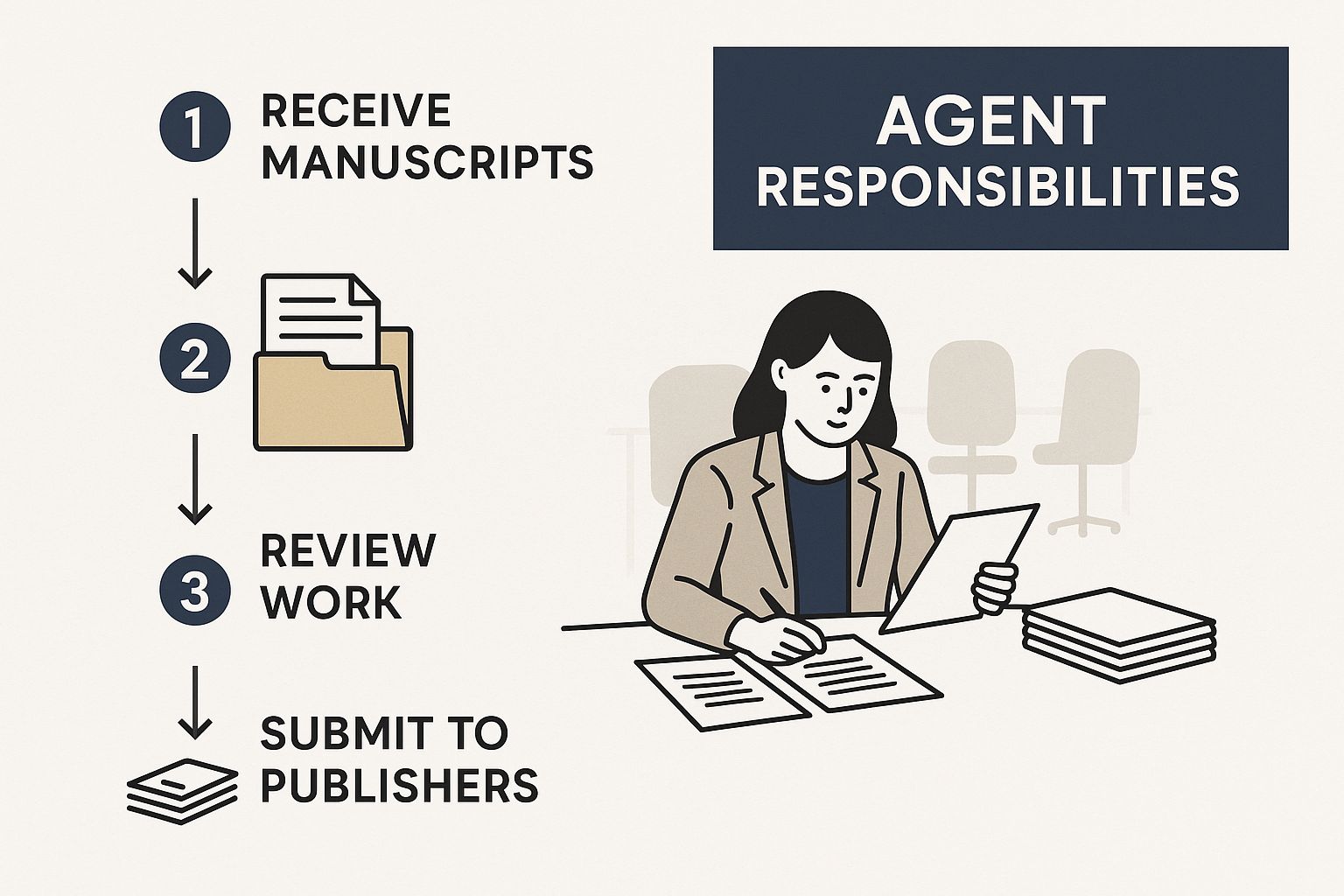Think of a literary agent as your personal champion in the world of traditional publishing. They're part talent scout, part deal-maker, and part career coach, all rolled into one indispensable guide. Essentially, they are the bridge that connects your manuscript to the publishing houses that can turn it into a book on the shelf.
The Role of a Literary Agent Explained
Ever wonder how an unknown writer gets a book deal with a huge publisher like Penguin Random House or Simon & Schuster? It’s not by mailing a manuscript to their office. In fact, most major publishers won't even look at submissions that come directly from an author. This is where an agent comes in.
They act as a crucial filter, a trusted gatekeeper. Publishers rely on agents to vet manuscripts and find the books that are polished, professional, and have real market potential. When an agent submits your work, it’s like getting a stamp of approval that tells an editor, "Hey, this one is worth your time."
What Does an Agent Actually Do?
An agent's job is so much more than just sending out your manuscript. They're your business partner, deeply invested in your success from the very beginning.
-
Finding and Developing Talent: Agents are constantly on the lookout for the next big thing, sifting through hundreds of queries to find hidden gems. Once they find a project they believe in, they often provide crucial editorial feedback to get the manuscript into the best possible shape before it ever goes out to publishers.
-
Masterminding the Submission Process: This isn't just a blind email blast. A good agent uses their inside knowledge and relationships to create a hand-picked list of editors they believe will love your book. They craft the perfect pitch, manage the entire submission strategy, and handle all the follow-ups.
-
Championing Your Contract: This is where an agent's expertise is priceless. They negotiate every single detail of the publishing contract on your behalf, fighting for the best possible author advance, royalty rates, and the rights to your work—like film, audiobook, and foreign translations.
A great agent doesn't just sell one book; they help build an author's entire career. Their goal is to create a long-term, successful partnership that benefits both the writer and the publisher, ensuring the author's creative vision is protected and profitable.
To help break it down, here’s a quick overview of the essential roles an agent plays.
A Literary Agent's Key Roles at a Glance
| Function | What It Means for You as an Author |
|---|---|
| Editorial Guidance | They help you refine your manuscript, making it stronger and more appealing to editors before submission. |
| Industry Access | They open doors to major publishing houses that are closed to direct submissions from authors. |
| Strategic Submissions | They know which specific editors are looking for a book just like yours, increasing your chances of an offer. |
| Deal Negotiation | They secure the best possible financial terms, including your advance, royalties, and other rights. |
| Career Management | They provide long-term career advice, helping you plan your next books and build a sustainable author brand. |
Ultimately, a literary agent is your advocate, your negotiator, and your strategic partner, navigating the complexities of the publishing industry so you can focus on what you do best: writing.
The Agent's Role: From Manuscript to Bookshelf
So, you've signed with an agent. Congratulations! Now the real work begins. Getting representation isn't the finish line; it's the start of a crucial partnership that turns your manuscript into a book that's ready for the market.
The first thing a good agent does is put on their editor hat. They'll dive deep into your manuscript, working with you to tighten the plot, flesh out the characters, and make sure every sentence sings. This isn't just a light proofread—it's an intensive, collaborative process to get the book into its best possible shape. Why? Because you only get one shot to impress an editor at a publishing house.
Once the manuscript is polished to a shine, your agent switches gears from editor to strategist. They don't just blast your book out to every publisher on a list. Instead, they use their industry connections and deep knowledge of the market to build a highly targeted submission list of editors they believe will truly connect with your work.
Here’s a look at the major roles an agent plays throughout the entire publishing journey.

As you can see, an agent is constantly juggling editorial guidance, strategic planning, and being your number-one supporter.
Championing Your Book and Your Career
The submission phase is a masterclass in patience. Your agent handles all the communication, navigating the rejections and keeping the faith when it feels like no one is biting. They're your advocate, your cheerleader, and your front-line defense, tirelessly pitching your book with genuine passion.
And when an offer (or hopefully, multiple offers) lands? This is where an agent truly earns their commission. They step into the role of a tough-as-nails negotiator.
Publishing contracts are essentially complex IP licensing agreements, and an agent's job is to fight for the best possible terms for you. This covers a lot of ground:
- The Advance: Pushing for the highest possible upfront payment against future royalties.
- Royalty Rates: Securing fair percentages on every format—hardcover, paperback, and ebook.
- Subsidiary Rights: Protecting and selling rights for things like audiobooks, film and TV adaptations, and international translations.
An agent isn't just selling one book; they're launching a career. The deal they negotiate can shape your financial future and open doors to new creative opportunities for years to come.
Of course, landing an agent in the first place is a huge hurdle. Most agents receive thousands of submissions a year but ultimately sign less than 1% of the authors who query them. They have to be incredibly selective, focusing on manuscripts they believe have real commercial potential.
From the first offer to deciphering royalty statements down the line, your agent manages the business of being an author so you can focus on what you do best: writing. To see how the publisher fits into all this, you can learn more about https://barkerbooks.com/what-does-a-book-publisher-do/.
Why You Need an Agent in Today's Publishing Market

Let's be blunt. Trying to land a deal with a major publisher without an agent is like trying to get into a sold-out concert without a ticket. It’s not totally impossible, but you’re making a tough job a whole lot harder. The single biggest reason boils down to one word: access.
Most of the big publishing houses have a strict no-unsolicited-submissions policy. That means if your manuscript arrives directly from you, it's likely to go straight into the bin, unread. Publishers rely on agents to be their professional filter, sorting through the mountain of manuscripts to find the gems that have real commercial potential.
When an agent submits your work, it’s not just another email in an editor's crowded inbox. It’s a professional recommendation from a trusted source, landing your manuscript on the right desk with a stamp of approval. Without that introduction, you’re stuck in the slush pile—a place most manuscripts go to be forgotten.
More Than Just a Foot in the Door
Getting past the gatekeepers is just the beginning. A good agent does so much more than just make introductions; they’re the business strategist who helps build your entire career as a writer.
The real value of a great agent shines during contract negotiations. Armed with deep industry knowledge and personal connections, they can secure much higher advances and better royalty rates than you could on your own. They also fight for you on the nitty-gritty contract details, like retaining subsidiary rights for film, audio, and international sales—things that can define your long-term success.
An agent's advocacy turns your book from a passion project into a real commercial product. They make sure you aren't just published, but published well, with a contract that sets you up for future growth.
The U.S. print book market is enormous, with recent sales topping 782 million units. But with so many books out there, an agent’s commercial judgment is essential to help you stand out. You can learn more about the competitive book market on newprint.com.
Ultimately, an agent is investing in you. They bring the industry credibility and expert negotiation skills needed to navigate the often-confusing world of publishing. To get a clearer picture of the road ahead, take a look at our guide on how hard it is to get a book published.
How Literary Agents Are Paid

Let's talk money. How an agent gets paid is probably the most important thing to understand about the author-agent relationship, and thankfully, it's pretty straightforward.
A legitimate literary agent works on commission only. Full stop. Their success is completely tied to your success, which means they only make money when you make money.
If anyone claiming to be an agent asks you for upfront "reading fees," "representation fees," or any kind of administrative cost, walk away. That's a huge red flag. The commission model is what keeps the whole system honest; it ensures your agent has real skin in the game and is motivated to get you the best deal possible.
Standard Commission Rates
While you'll see slight variations from one agency to another, the payment structure is remarkably consistent across the publishing industry. Here’s what you can generally expect:
- Domestic Sales: For deals made in your home country (like the US for an American author), the standard commission is 15%. This applies to your advance and any subsequent royalties.
- Foreign & Subsidiary Rights: When it comes to more complex sales—think film rights, international translations, or audiobooks—the commission is higher, usually 20% to 25%. This bump accounts for the extra legwork and often involves splitting the fee with a sub-agent who specializes in that specific market.
The bottom line is this: an agent's income is always a percentage of the money they earn for you. They don't get a paycheck until your book sells.
So, let's put it into practice. Say your agent lands you a $50,000 advance from a publisher. Their 15% cut comes out to $7,500, and the remaining $42,500 is yours. This performance-based system is designed to protect authors and keep agents hungry to champion your work.
How to Find and Query the Right Literary Agent
Finding a literary agent can feel like a monumental task, but with the right strategy, it's more like a calculated treasure hunt than a blind search. The goal isn't to blast your manuscript to every agent you can find; it's to build a hand-picked list of professionals who are actively looking for a book just like yours.
So, where do you start? Thankfully, there are some fantastic tools out there for authors. Websites like QueryTracker and Publishers Marketplace are goldmines of information. You can filter agents by the genres they represent, see what kinds of books they've recently sold, and get the nitty-gritty details on their submission guidelines. A targeted search is a smart search—it saves you a ton of time and seriously boosts your odds of getting a good look.
Do Your Homework: Why Specialization Matters
In today's crowded market, agents are becoming more and more specialized. Think of them as experts in a particular field. One recent analysis found that 36% of agents now concentrate on specific genres, like sci-fi or historical fiction, because it helps them better serve publisher needs and champion a book's potential. For more on this, agent specialization trends at Accio.com offers some great insights. This is precisely why sending your epic fantasy to an agent who only sells cozy mysteries is a waste of everyone's time.
Once you have a solid list of potential agents, it's time to put together your query package. This is your professional introduction, your first and often only chance to make a stellar impression.
A query package isn’t just an email. It’s a compelling, professional pitch arguing why your book belongs on a bookshelf. Every single piece needs to be polished and perfect.
Your query package usually has three essential parts:
- The Query Letter: This is your one-page sales pitch. It needs a killer hook, a concise summary of your book's core concept, and a little bit about you.
- The Synopsis: A one-to-two-page overview of your entire plot—spoilers and all. It proves to the agent that you know how to structure a complete, satisfying story from beginning to end.
- Opening Pages: This is where your writing has to shine. You'll typically include the first five or ten pages of your manuscript to showcase your voice and hook them from the very first line.
Nailing the Perfect Pitch
Nothing gets an agent to hit the 'delete' button faster than a generic, copy-pasted query. Personalization is everything. Show them you've done your homework. Mention a client of theirs you admire or explain why your book is a perfect fit for their manuscript wishlist. It proves you're serious and not just spamming their inbox.
The opening line of your query letter is your most critical weapon. It has to be sharp enough to cut through the noise of a hundred other submissions and make the agent stop and read. To get this crucial document right, take a look at our guide and query letter template. Your career could depend on it.
Common Questions About Working with a Literary Agent
Diving into the world of literary agents can feel like learning a new language. You’re bound to have questions, and that's perfectly normal. Let's clear up some of the most common ones so you can start your search for the right agent with confidence.
Do I Have to Pay a Literary Agent Upfront?
No. Absolutely not. A legitimate, professional literary agent works on commission only. Think of them as a partner who invests their time and resources in your book because they truly believe in its potential to sell. They only make money when you do.
Their payment is a percentage—typically 15% for domestic deals—of the advances and royalties they secure for you.
Key Takeaway: An agent's success is directly tied to yours. If anyone asks you for an upfront fee for reading, representation, or "administrative costs," they are not a traditional literary agent. It's a major red flag, and you should walk away.
This commission model is the bedrock of the author-agent relationship. It ensures your agent is motivated to fight for the best possible deal for your book.
Can I Have More Than One Agent?
This is a common question, but for a single book or for all your book projects, the answer is almost always no. When you sign a contract with a literary agent, you’re entering into an exclusive partnership. They become the sole person with the right to represent your manuscript to publishers.
Having multiple agents trying to sell the same book would be chaotic and unprofessional—it just isn't done. While some high-profile authors might have a separate agent for film or foreign rights, this is usually handled in collaboration with their primary literary agent. For your books, you'll have one dedicated partner in your corner.
How Long Should I Wait Before Following Up on a Query?
Patience is a virtue in publishing, especially when you're querying. The very first thing to do is check the agent's submission guidelines on their website. Many will state their expected response time, which could be anything from 12 to 16 weeks, or even longer. If they give you a timeframe, respect it.
If the guidelines don't mention a specific window, a good rule of thumb is to wait about 8-12 weeks. After that period, it’s perfectly acceptable to send a short, polite follow-up email. Just gently remind them of your name, your manuscript title, and the date you originally queried, and ask for a quick status update.
What Is the Difference Between an Agent and an Editor?
It’s easy to mix these two up, but their roles are very different, even though they both want your book to be a success.
-
A literary agent is your career champion and business partner. Their main job is to sell your manuscript to the right publishing house, negotiate your contract, and help you build a long-term career as an author.
-
An editor works for a publishing house. Their role is to acquire books they believe will sell well for their company. Once they acquire your book, they become your creative partner, working with you to shape the manuscript and get it ready for readers.
Your agent will likely give you editorial notes to get your manuscript into fighting shape before it goes out on submission. But their primary function is making the deal. The editor at the publishing house takes over once the deal is done, focusing solely on polishing the book itself.
At BarkerBooks, we guide authors through every stage of their publishing journey, from manuscript refinement to global distribution. Let our team of experts help you turn your writing dream into a reality. Find out how we can support you at https://barkerbooks.com.
